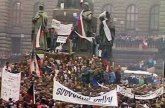Difference between revisions of "Czech Protests Erupt"
(Created page with "=== October 28th === Political protest becomes a social movement October 28th: Massive protests took place within Prague's Wenceslas Square as hundreds of thousands protested...") |
(→October 28th) |
||
| Line 1: | Line 1: | ||
=== October 28th === | === October 28th === | ||
| − | + | [[File:Tbwoct28.jpg|400px|thumbnail|left]] | |
Political protest becomes a social movement | Political protest becomes a social movement | ||
October 28th: Massive protests took place within Prague's Wenceslas Square as hundreds of thousands protested Czechoslovakia's Communist Government on the 71st anniversary of Czechoslovakian independence in 1918. | October 28th: Massive protests took place within Prague's Wenceslas Square as hundreds of thousands protested Czechoslovakia's Communist Government on the 71st anniversary of Czechoslovakian independence in 1918. | ||
| Line 12: | Line 12: | ||
But the protesters refused to give in, and within weeks, Communism would be overthrown and democracy established in Czechoslovakia. | But the protesters refused to give in, and within weeks, Communism would be overthrown and democracy established in Czechoslovakia. | ||
| − | [[Category: | + | [[Category:The Berlin Wall 1961-1989]] |
Latest revision as of 08:55, 31 March 2014
October 28th[edit]
Political protest becomes a social movement October 28th: Massive protests took place within Prague's Wenceslas Square as hundreds of thousands protested Czechoslovakia's Communist Government on the 71st anniversary of Czechoslovakian independence in 1918.
The crowd is buoyed by the events that had been taking place around Eastern Europe. Just days prior, Erich Honecker was forced to step down as leader of East Germany. In Hungary, the Communist Party held its last conference and the country officially transitioned to the democratic Republic of Hungary. Many Czechs and Slovaks felt that this was their time to demand freedom and democracy within their country.
The protests and demonstrations would eventually lend themselves to the formation of a new political movement, the Civic Forum, whose stated goal was to unify all anti-authoritarian forces in Czechoslovakia in order to successfully overthrow the Communist government. This movement was led by Vaclav Havel, a playwright whose name would become synonymous with the struggle for democracy.
The protests would be met with fierce resistance by the Communist government,. As protesters chanted "Freedom!" and "Democracy Now!", they came face to face with with riot police, who used strong arm tactics such as violence and arrests to attempt to intimidate the protesters into submission.
But the protesters refused to give in, and within weeks, Communism would be overthrown and democracy established in Czechoslovakia.
